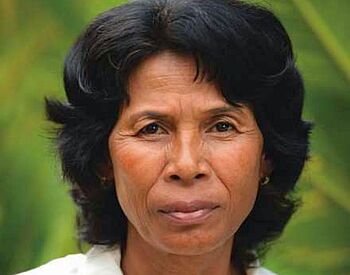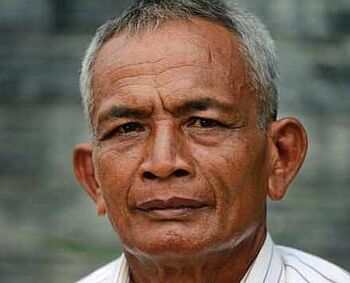The Khmer Rouge left behind more than 6,000 prisoner registration photos in special prison S-21. The photographed detainees include many young people and children. Although the events took place more than 40 years ago, many survivors are still traumatized today. This led the Dutch non-governmental organization “TPO International” to found a partner organization in Cambodia in 1995. To date, it has provided psychiatric support to more than 200,000 people there.
Credit: Hubertus Knabe
“In the jungle I saw a lot of dead people.”

Hang Nget was 16 years old when she was deported with her family in 1975. She and other teenagers were forced to plant rice and dig irrigation canals for the rice fields. She mostly associates constant hunger with the time of the Red Khmer. Her six-person family received only three cans of rice a day; later the ration was reduced to two. In testimony published by TPO, a non-governmental organization, she describes how her brother was killed for secretly stealing food.
"In 1976, darkness fell over my family. Because of the lack of food, my third brother stole leftover rice from the kitchen repeatedly. In the end, the Khmer Rouge caught and punished him badly.
It was a very frightening day for him. He was 10 years old and was tortured in the rice field by three Khmer Rouge guards. They laid my brother on the ground, face downwards, and put a wooden board on his back. The three guards stood on top of that board when it was on his body. He was in a lot of pain and cried loudly to me and my mother for help. We could not do anything to help him. We could only watch it. We could not even cry. I was very shocked and frightened. I felt weak, had no energy at all and had palpitations.
Later, when I visited my mother again, she told me that he had been killed for having stolen a piece of meat. My mother witnessed the killing. She followed the guards when they arrested my brother. She was about 50 meters from the killing place. She saw how they hit my brother on the back of the head with a long stick and how they threw him into a bomb crater and covered him up with earth. When I heard about his suffering, I felt very tight in the chest and had pain in the stomach. My body was shaking. I cried on my own for a few days. (...)
In 1979, when Vietnamese soldiers arrived, I escaped from Rumlich jungle towards Rumpek village through the thick jungle. In the jungle I saw a lot of dead people, even children. They had died of starvation. Their bodies were very skinny. I was very frightened. This image remains in my mind even when I close my eyes. I often feel scared, tense and have palpitations. I often deal with these symptoms by moving, exercising, and praying with burning incense sticks dedicated to the dead for them to be reborn soon."
Click here to read Hang Ngetgeht’s full report.
Links
Oral history videos from Yale University (Khmer)
After the Dictatorship. Instruments of Transitional Justice in Former Authoritarian Systems – An International Comparison
A project at the Department of Modern History at the University of Würzburg
Twitter: @afterdictatorship
Instagram: After the dictatorship
With financial support from the German Federal Ministry for Economic Cooperation and Development
“They only stopped when we lost consciousness”

Kim So was a young monk when the Khmer Rouge invaded Phnom Penh in April 1975. When the deportation of the city’s inhabitants began, he returned to his hometown as a precautionary measure. He had to work in a mobile brigade there. Since he often returned from work very late, the cook would leave food for him. This led to the accusation that the 22-year-old was having an affair with her – a serious offense for the Khmer Rouge. In an interview he tells us how he felt when this happened. The DC-CAM Documentation Center also interviewed survivors like Kim So.
"In October 1977, I was arrested and imprisoned. They accused me of having engaged in a sexual relationship. In prison I met a man called Chan. He asked me, ‘What did they accuse you of?’ I replied, ‘I was accused of having a sexual relationship.’ He continued asking, ‘Did you do that?’ My response was correct as I did not do anything. He then told me that I should stick to this answer, otherwise I would be killed.
I did not at all expect a confession from the chef, whose name was Pheap. She kept telling them that the accusation was not true, even though they severely beat her. That was also a reason for me to stick to my answer.
The prison, built of wood and bamboo, was so awful. It was such a horrible place for prisoners. Our legs were cuffed and we could not even move. We could only sit and wait for a small meal. We were tortured while being interrogated. We also had to sleep in the same place where we ate and defecate. It smelled horrible and the other prisoners screamed while they were tortured. I will never forget how they tortured prisoners during interrogations.
One day, my hands were tied and I was given electric shocks. I kept responding to them with the same answer because I had not done anything wrong. As I stuck to the same response, they pulled out a bamboo stick and beat me on my back until I was bleeding all over. I was about to confess as it was too painful and I could not bear it any longer. Remembering Mr. Chan’s words as well as the statement made by the chef, Mrs. Pheap, encouraged me to withstand the cruel torture. They only stopped torturing us when we lost consciousness. The most horrible torture method I experienced was when they pulled a plastic bag over my head and filled it with water. It is unbelievable that they inflicted such horrible torture on human beings.
I still remember everything that has happened to me and I will never ever forget it. Recalling all those experiences makes me feel as if I am back in that situation and as if it is happening to me again. I feel the pain again. I notice that my heart starts beating fast. I feel tension in my head and muscles. My toes and fingers are getting cold while my body is sweating. I need to take deep breaths and I think of my parents, especially my mother. Then I do a little massage, drink some water and leave the room so that I feel a bit of relief."
Click here to read Kim’s entire report.
Links
Oral history interviews and other videos from DC-CAM (Khmer with English subtitles)
Audio Interviews from DC-CAM (khmer)
Interviews from DC-CAM with staff of the Khmer Rouge Tribunal